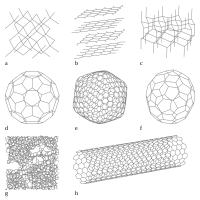
Photo from wikipedia
The term “carbon-based spintronics” mostly refers to the spin applications in carbon materials such as graphene, fullerene, carbon nitride, and carbon nanotubes. Carbon-based spintronics and their devices have undergone extraordinary… Click to show full abstract
The term “carbon-based spintronics” mostly refers to the spin applications in carbon materials such as graphene, fullerene, carbon nitride, and carbon nanotubes. Carbon-based spintronics and their devices have undergone extraordinary development recently. The causes of spin relaxation and the characteristics of spin transport in carbon materials, namely for graphene and carbon nanotubes, have been the subject of several theoretical and experimental studies. This article gives a summary of the present state of research and technological advancements for spintronic applications in carbon-based materials. We discuss the benefits and challenges of several spin-enabled, carbon-based applications. The advantages include the fact that they are significantly less volatile than charge-based electronics. The challenge is in being able to scale up to mass production.
Journal Title: Nanomaterials
Year Published: 2023
Link to full text (if available)
Share on Social Media: Sign Up to like & get
recommendations!